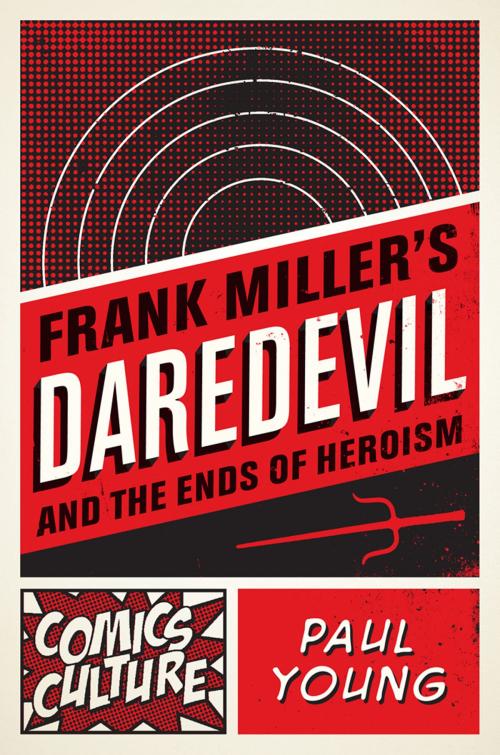Frank Miller's Daredevil and the Ends of Heroism
Comics & Graphic Novels, Superheroes, Nonfiction, Social & Cultural Studies, Social Science, Cultural Studies, Popular Culture, Fiction & Literature, Literary Theory & Criticism| Author: | Paul Young | ISBN: | 9780813573038 |
| Publisher: | Rutgers University Press | Publication: | July 27, 2016 |
| Imprint: | Rutgers University Press | Language: | English |
| Author: | Paul Young |
| ISBN: | 9780813573038 |
| Publisher: | Rutgers University Press |
| Publication: | July 27, 2016 |
| Imprint: | Rutgers University Press |
| Language: | English |
2017 EISNER AWARD NOMINEE for Best Academic/Scholarly Work
In the late 1970s and early 1980s, writer-artist Frank Miller turned Daredevil from a tepid-selling comic into an industry-wide success story, doubling its sales within three years. Lawyer by day and costumed vigilante by night, the character of Daredevil was the perfect vehicle for the explorations of heroic ideals and violence that would come to define Miller’s work.
Frank Miller’s Daredevil and the Ends of Heroism is both a rigorous study of Miller’s artistic influences and innovations and a reflection on how his visionary work on Daredevil impacted generations of comics publishers, creators, and fans. Paul Young explores the accomplishments of Miller the writer, who fused hardboiled crime stories with superhero comics, while reimagining Kingpin (a classic Spider-Man nemesis), recuperating the half-baked villain Bullseye, and inventing a completely new kind of Daredevil villain in Elektra. Yet, he also offers a vivid appreciation of the indelible panels drawn by Miller the artist, taking a fresh look at his distinctive page layouts and lines.
A childhood fan of Miller’s Daredevil, Young takes readers on a personal journey as he seeks to reconcile his love for the comic with his distaste for the fascistic overtones of Miller’s controversial later work. What he finds will resonate not only with Daredevil fans, but with anyone who has contemplated what it means to be a hero in a heartless world.
Other titles in the Comics Culture series include Twelve-Cent Archie, Wonder Woman: Bondage and Feminism in the Marston/Peter Comics, 1941-1948, and *Considering Watchmen: *Poetics, Property, Politics.
2017 EISNER AWARD NOMINEE for Best Academic/Scholarly Work
In the late 1970s and early 1980s, writer-artist Frank Miller turned Daredevil from a tepid-selling comic into an industry-wide success story, doubling its sales within three years. Lawyer by day and costumed vigilante by night, the character of Daredevil was the perfect vehicle for the explorations of heroic ideals and violence that would come to define Miller’s work.
Frank Miller’s Daredevil and the Ends of Heroism is both a rigorous study of Miller’s artistic influences and innovations and a reflection on how his visionary work on Daredevil impacted generations of comics publishers, creators, and fans. Paul Young explores the accomplishments of Miller the writer, who fused hardboiled crime stories with superhero comics, while reimagining Kingpin (a classic Spider-Man nemesis), recuperating the half-baked villain Bullseye, and inventing a completely new kind of Daredevil villain in Elektra. Yet, he also offers a vivid appreciation of the indelible panels drawn by Miller the artist, taking a fresh look at his distinctive page layouts and lines.
A childhood fan of Miller’s Daredevil, Young takes readers on a personal journey as he seeks to reconcile his love for the comic with his distaste for the fascistic overtones of Miller’s controversial later work. What he finds will resonate not only with Daredevil fans, but with anyone who has contemplated what it means to be a hero in a heartless world.
Other titles in the Comics Culture series include Twelve-Cent Archie, Wonder Woman: Bondage and Feminism in the Marston/Peter Comics, 1941-1948, and *Considering Watchmen: *Poetics, Property, Politics.















